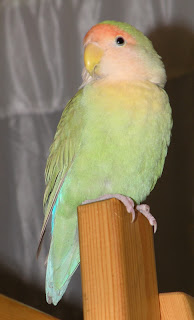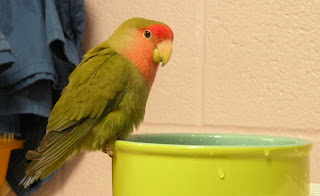A lovebird arrived at the shelter on May 10th.I didn't meet him for a few days, but I heard about him from one of the staff.
"You see our new lovebird?" He asked me. "Vicious little biter. We named him Tyson! You want him?"
"Uh, no thanks." I said. "One aggressive lovebird is enough for me."
This is my lovebird, Bailey. And I did him wrong in that description - he's not 'aggressive' or 'mean', but he's not exactly cuddly. He's a good example of how a parrot can be messed up through no fault of its own.
Bailey came from a rough life. We know he had at least 4-5 homes before us, probably more. At some point he ended up in the wild, having either escaped or been let 'free'. Thin and cold, he landed on a woman's shoulder down by the lake one day, probably desperate for food and water. She stuffed him in her purse to take him home, and kept him for a few days. Not knowing anything about parrots, she quickly got tired of his incredible noise and refusal to go anywhere near her. She gave him to a friend.
That friend kept him in a tiny cage and never let him out. Soon she got tired of him too, and gave him to a couple she knew. They tried letting him out but couldn't handle his wild behaviour and aggression. Eventually he got relegated to cage life once again. They named him "Peaches" although that soon became "Screeches" due to his noise.
At this point, my mom and I had decided to get a second bird to join our beloved cockatiel. We'd decided on another tiel, when we received a phone call from this couple.
We didn't really know anything about lovebirds. I wasn't into rescue yet and we certainly didn't know anything about dealing with abused birds. He seemed a little wild but ok, so we scrapped our plans for a cockatiel and took him home.
We soon named him Bailey after Bailey's Irish Cream, because we thought he'd drive us to drink. The first year was...tough. We found out he'd been abused, neglected and tossed from home to home. He had a lot of issues. He would lunge at your hands and bite deeply without any provocation. He screamed at everything nonstop. He wouldn't come out of the cage without biting, then wouldn't go into the cage without biting. He ripped everything to shreds.
We regretted the hasty decision to take him, but we had made the commitment. We fuddled our way through his issues. It took a long, long time.
We've had Bailey for four years now. He has made immense progress.
The great thing about Bailey is that he's damn smart. Once he stopped panicking about everything that had hurt him in the past, he learned easily. He learned not to bite unless provoked, to 'step up' for food. He enjoys our company and spends most of his time with us. And as long as one of us is home, he is free to roam the house.
This is his home now. He is extremely protective of our home and our family. When we bring in new fosters, he will sit on the cage staring at them for a couple of days to make sure they aren't a danger. He despises strangers and when we move furniture - change is never welcome. He loves this place and he even regards his cage as a safe haven now, putting himself to bed at night. And you know what - I love that damn bird to pieces.
In the wrong hands, Bailey would be a nightmare. He is not really trained in the traditional sense. He knows the commands 'no', 'git', 'go to bed', 'quiet' and 'hop up' (if food is involved) - but he'll only obey if he respects you. He will misbehave if you don't realize that he is highly intelligent and treat him as such.
Bailey is not a pet I recommend. He is precisely why I don't recommend parrots to anyone, because they aren't 'pets'. They are companions, much too smart for their own good and with extremely specific, high-maintenance needs. I can see the intelligence in Bailey's eyes and I know that I have to work with him, not against him, if I want us to co-exist. And he can't be rehomed - especially with his past, he would not be able to handle a change in family. He will be with me for the rest of his life .
Back to the lovebird at the shelter. When I finally met Forrest, I had to laugh.
Yes, he bites. He bites a lot actually, and you know why? Because no one taught him that biting is bad.
Forrest is a little mischief-maker, but he's not aggressive. He's been taught that it's a game to nip at fingers in the cage, and he likes to chew everything. It's just a bad habit, and with consistency, he will learn to drop it. I managed to avoid a single bite by giving him his space, showing him respect and taking the fun out of the biting game.
Here's a nifty tip: If a bird bites you, push back towards his face. It's instinct to pull away, but that just makes it a game. Pushing towards him is uncomfortable for him and forces him to let go. Doesn't usually take long before they figure out biting's no fun.
Besides that one bad habit, Forrest is actually an awesome little guy. Super curious and outgoing and playful. He loves to chew paper and he's very people-oriented; always has to know what you're doing and will sit on your knee. He really liked my camera and kept crawling all over it. He even had a nice bath.
Yes, he's badly behaved inside his cage. And he doesn't like being cooped up. Outside the cage, he's a playful little brat who needs to be taught some manners, but otherwise he's a friendly, happy, cheerful guy.
He'll make an awesome companion, but he needs someone with the right mentality or somewhere down the line, he'll end up like Bailey.
They aren't called lovebirds because they're loving and sweet all the time. They're called lovebirds because they form incredibly strong attachments to the family they get - bird, people, whatever. They are sensitive, high-strung, high-maintenance animals, but it doesn't mean they're any less deserving of a family. If anything, it means they need one more, because without that consistency, they are lost.











3 comments:
Your Bailey reminded me of a lovebird my parents had that was given to them as a rescue - I can't recall what his actual name was, because we nicknamed him Killer - one of his past owners had tried to put a companion in the cage with him and he killed it. My mom had said blood had coated his face. Who knows what that poor bird had gone through? Thank you for your post, and if you have any other small animal handling tips and tricks, please share them on your blog!
www1130
canada goose outlet
ralph lauren
canada goose outlet
off white jordan
hermes belt
red bottom shoes
ugg boots outlet
air max 90
jordan shoes
moncler jackets
bape
off white outlet
jordans
yeezy 380
jordan 13
Post a Comment